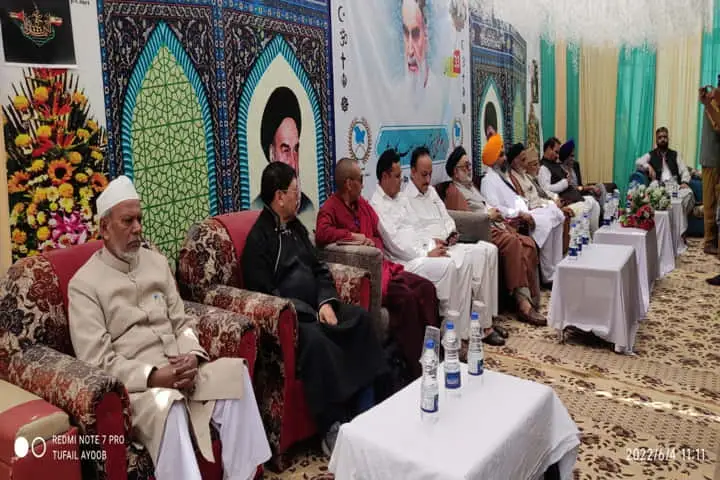As questions are being raised over the continued silence of Kashmir’s civil society and politico-religious leadership on the targeted killing of the minority community members, an interfaith conference on Saturday, June 4, has come out with an unequivocal condemnation of ‘extremism and bloodshed’.
The conference organised by Anjuma-e-Sharayi Shiaan, a politico-religious organisation of the Kashmiri Shia Muslims, at Jamia Babul Ilam Mirgund Budgam, passed a resolution, unanimously condemning the targeted killings of a number of Kashmiri Pandits besides resident, migratory and non-local members of the Hindu community. It expressed complete solidarity with the victims of the current spree of killings.
During 2nd interfaith dialogue conference at Jamia Babul ilm Budgam #Kashmir. pic.twitter.com/1lzcj3H8bg
— Sajjad Kargili | سجاد کرگلی (@SajjadKargili_) June 5, 2022
About a dozen of the Kashmiri Pandits and resident and non-local Hindus have been shot dead in the last over a month by unidentified terrorists, believed to be the separatist militants. Three particular guerrilla outfits—The Resistance Front (TRF), United Liberation Front (ULF) and Kashmir Freedom Fighters (KFF)—which according to the Police and security forces are front organisations of the global terrorist groups Lashkar-e-Tayyiba (LeT) and Jaish-e-Mohammad (JeM), have purportedly claimed responsibilities of the recent killings in Kashmir over their online portals. Both LeT and JeM are known outfits sponsored by Pakistan’s Inter Services Intelligence (ISI), the root cause of the so-called Kashmir Jihad.
Those killed in such pistol attacks since last month include a Kashmiri Pandit clerk Rahul Bhat, a wine shop salesman Ranjit Singh, a government school teacher Rajni Bala, Ellaquai Dehati Bank officer Vijay Kumar and a brick kiln worker Dilkhush Kumar. A female Muslim TV artist and YouTuber Amreen Bhat was also gunned down in the same killing spree which is still unabated.
During 2nd interfaith dialogue conference at Jamia Babul ilm Budgam #Kashmir. pic.twitter.com/1lzcj3H8bg
— Sajjad Kargili | سجاد کرگلی (@SajjadKargili_) June 5, 2022
The resolution emphasised that a multicultural and multi-religious dialogue was essential in the current circumstances for unity and larger interest of the Kashmir society comprising different faiths.
“Plurality is a basic and fundamental fact of the Kashmiri society and everyone has to understand this pluralistic nature of Kashmir society. Every religion also has to be pluralistic in its own perspective and promote this pluralism among its adherents”, said a statement issued by the organisers. It added that inter-faith dialogue has to contribute towards communal harmony and welfare of humanity.
All the 15 speakers representing different clerical entities urged for unity among all communities “to thwart evil designs of vested interest” and called for more such interfaith dialogues across Kashmir “to bridge the gaps and let the flower of Kashmir’s brotherhood, amity and affinity bloom”.
Headed by the Shia politico-religious leader Aga Syed Hassan Al-Moosavi, Anjuman-e-Shariyi Shiaan has espoused the cause of ‘azadi’ since 1990, while being a constituent of the All-Party Hurriyat Conference (APHC). After the APHC’s disintegration in 2003, Anjuman first sided with the Hurriyat faction of hardliner Syed Ali Shah Geelani but subsequently united with the faction led by Mirwaiz Umar Farooq. Mirwaiz Umar’s representative Mohammad Sayeed-ur-Rehman Shams was a participant and speaker at the interfaith conference.
The resolution called for early release of Mirwaiz Umer from his house detention and removal of restrictions on religious practices at the Jamia Masjid Srinagar.
“This Conference, teaches us how to sit together for a dialogue according to the tenets of the holy Quran and the way of life and conduct of the Prophet Muhammad (SAW) to make a safe and sound world free from sectarianism, extremism, war and bloodshed”, Aga Hassan asserted at the conference. He added that interfaith dialogue was “essential to avoid fanaticism which leads to confusion”.
“The selfish evil forces with vested interest promote fanaticism to divide and to create communal disharmony to fulfil their selfish desires. But interfaith dialogue provides space for people of different religions to come together and discuss their religions, clarify the doubts and promote inter-religious understanding and creates inter-religious relations, which avoids frictions between religious and religious communities”, Aga said.
Among others the conference was attended by Mufti Nasir ul Islam, Maulana Kurshid Ahmed Kanoongo, Chairman Himayat ul Islam, Maulana Abdul Lateef , Maulna Sheikh Abdul Majeed of Imam Khomeini Memorial Trust, Kargil, Sajjad Hussain Kargili, Allama Sheikh Hassan Jaffari, Imam Jumah Skardu, who addressed the gathering through WhatsApp, Kashmiri Pandit leaders Sanjay Saraf and Ravinder Pandita, Christian community representatives Pastor Paul and Dr John Philips, Buddhist leader Chewang Rigzin Paljor and some representatives of the Sikh community and Gurudwara Prabhandak Committee.
Even as the speakers did not identify the masked terrorists behind the current killing spree, their assertions disowned and isolated the assassins from the Kashmir society.
Also Read: India mulls befitting response after Pakistan steps up targeted killing of Hindus in Kashmir
Also Read: How Vlogger Amreen’s murder is an attempt to silence women artists from Afghanistan to Kashmir




















